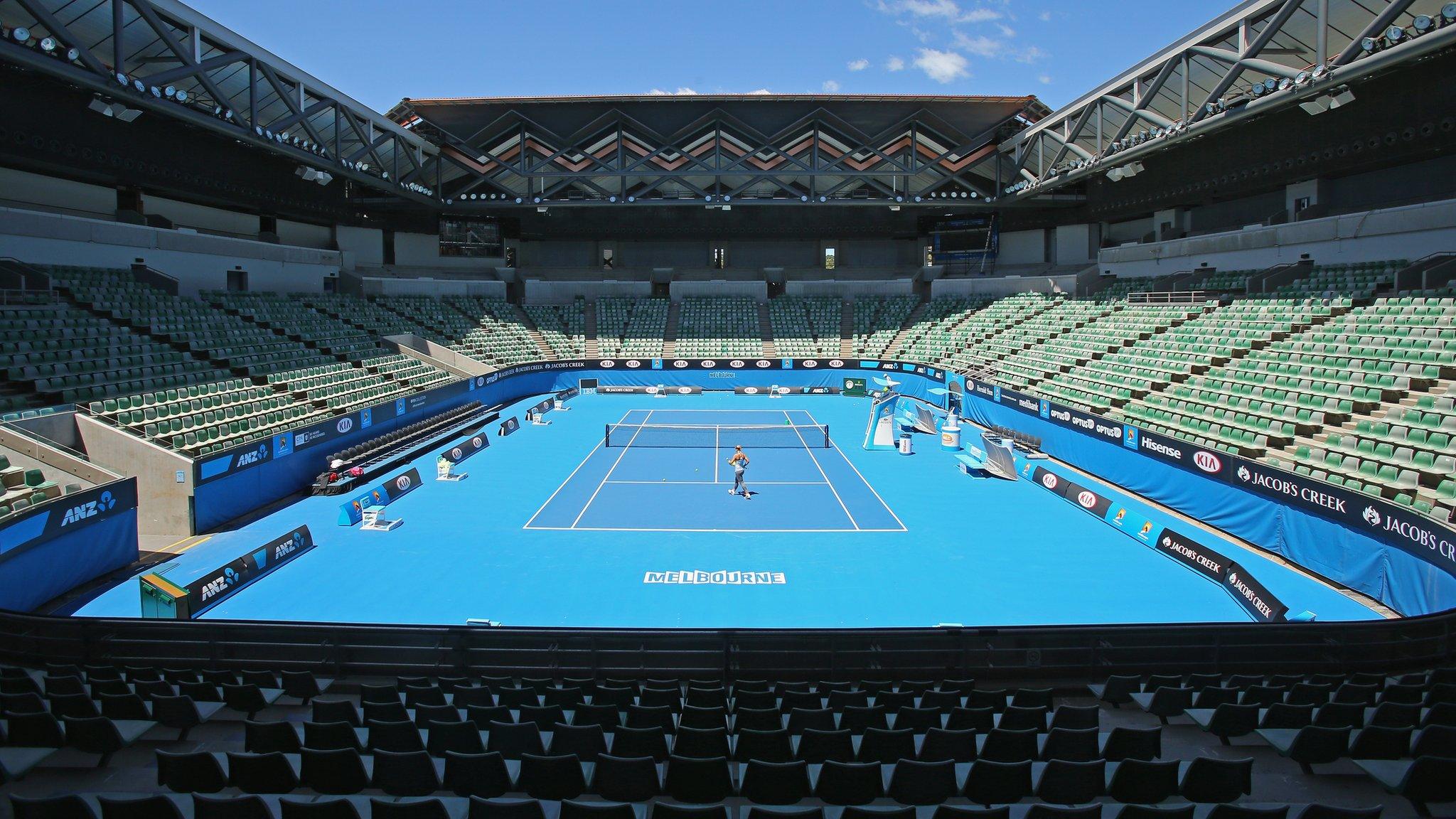Andy Murray: Can Briton reach Wimbledon summit?
- Published
- comments
Murray 'no regrets' over last final
And so, after a fortnight of illogical shocks and underdog upsets, the host nation will gather around its televisions, radios and laptops this weekend to pray for just one more.
This has been a Wimbledon where little has made sense, where champions have been dethroned by mere foot-soldiers and rock-solid wagers crumbled into dust. So it was again in Andy Murray's late-night semi-final on Friday, when the clubbing serve and forehands of the unheralded Jerzy Janowicz had the darling of the home crowd rolling on the ropes until the sun was down and the Centre Court lights up.
That he will walk out for Sunday's final as marginal outsider against Novak Djokovic is entirely logical. Djokovic has six Grand Slam titles, Murray one; he has taken this title before, Murray has not. But so too is the belief that this time, at last, the Briton can climb the final summit.
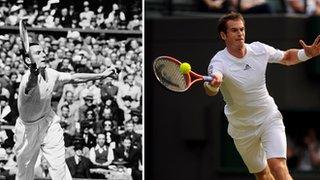
Can Murray become the first British man to win Wimbledon since Fred Perry in 1936?
A year ago, when Murray became the first Briton in 74 years to reach the men's singles final here, there was delight in that achievement alone. Twelve months on, there has been a subtle yet significant change: aspiration replaced by expectation, both player and his raucous support with eyes on the ultimate prize from the very first Monday of the tournament.
Neither is this simply patriotic emotion at work. Murray is entirely deserving of his number two ranking, busting free of the stranglehold of the old big three over the past 18 months, albeit with the assistance of Roger Federer's advancing years and Rafael Nadal's arthritic knees.
The last time he played Djokovic in this old arena, in the semi-finals of last summer's Olympics, he sent him packing in straight sets. He has reached the final of the last four Grand Slam events he has contested.
It is a trajectory that has been aiming inexorably upwards ever since that first Wimbledon semi-final defeat back in 2009. Well beaten by Andy Roddick that day, he was dismantled by the superior Nadal a year later, took a set off the Spaniard in defeat in 2011 and then made it past Jo-Wilfried Tsonga a year ago.
Each year an improvement, each summer a little more belief.
"The biggest difference to the Murray of a few years ago is his experience," says four-time Wimbledon semi-finalist Tim Henman. "But physically and technically he is a better player as well.
"His game style is getting more and more aggressive. In 2009 he was still very reactive, not proactive, but now he is looking to dictate more, and when he gets that balance right he is as good as anyone."
That advance has not been powered by the classic grass-court engine of a blistering serve. Murray's average first-serve speed this summer is three miles per hour down on the 119mph he was clocking in 2010; his second serve has slowed up even more, from an average of 95 mph two years ago to 84 mph today. Placement and variety, not raw pace, are his weapons.
There is more beef on his forehand - an average speed of 72mph in these championships, well up on the 66mph of 2010 - but as important is his near-peerless return of serve. He has broken his opponents more than any other man in this tournament, his four-set defeat of Janowicz containing more breaks of serve in a single match than the Pole had conceded in his five previous matches put together.
The other great lesson of that often anxious semi-final triumph on Friday, just as it had been in the epic five-set win over Fernando Verdasco in the quarter-finals, was that the Murray of 2013 - augmented by the experience and ambition of coach Ivan Lendl - is stronger mentally than he has ever been before.
On both occasions he kept his belief even as others were rapidly losing theirs; in both contests he found a way to rouse himself from slumps that in previous years would have become fatal tail-spins. Just as brutal physical conditioning has carried him towards the pinnacle, so that Olympic gold medal and US Open triumph last season convinced him he belongs there.
Against any other man, Murray would be favourite with the bookmakers as well as the home crowd. But this is Djokovic, who has beaten him in two Australian Open finals, who is in his 11th Grand Slam final, who has reached more consecutive Slam semi-finals than Rod Laver, Andre Agassi or Bjorn Borg.
There were times in his epic five-set victory over Juan Martin Del Potro when you wondered if he too was about to fall victim to the curse of the favourite at this Wimbledon, flushed down the gurgler just as Nadal and Federer had been in that tumultuous first week.
Should this give Murray greater hope? Even after the longest semi-final in Wimbledon history, Djokovic will have recovered physically by Sunday afternoon. But Del Potro blasted a few cracks in his previous flawless exterior, not just taking sets off him for the first time in these championships but leaving him rattled and angry when previously he has been serene.
Murray's supporters will be assailed by nerves between now and then nonetheless.
No matter that his achievements in making these successive finals are something that was once thought impossible and in a few short years might be looked back on as a wondrous golden period for the sport in this country.
This is the Wimbledon men's singles title, the lost ark of British sport, the national treasure stolen away overseas and thought gone for good.
With that unique allure comes unparalleled pressure.
A man who won his nation's first Grand Slam title in 76 years should never be thought of as a nearly man. But to lose a sixth Grand Slam final in seven and a second Wimbledon on the bounce would be the cruellest torment for a man who has worked so hard for so long.
Britain expects. It will be apprehensive, because of that history, and because Djokovic is at his peak. But it also hopes like never before. This year could be different. And if it is, none of us watching will ever forget it.
- Published7 July 2013
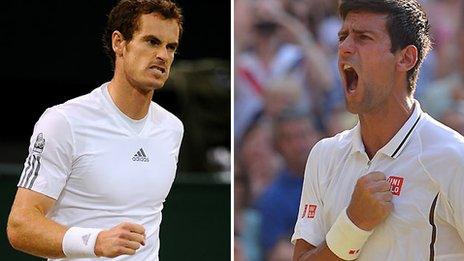
- Published5 July 2013
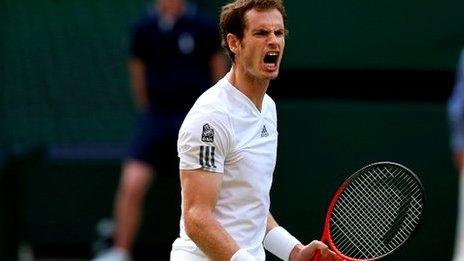
- Published5 July 2013
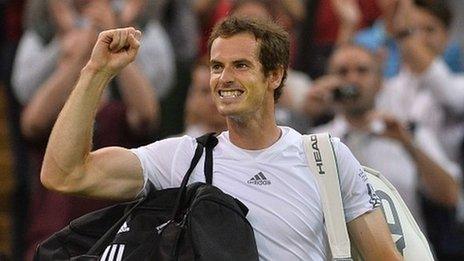
- Published5 July 2013
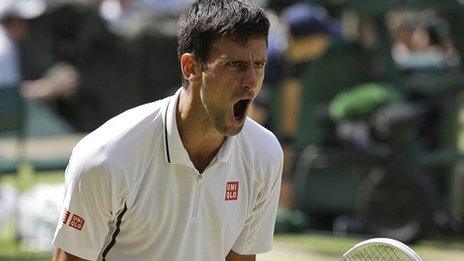
- Published5 July 2013

- Published9 November 2016
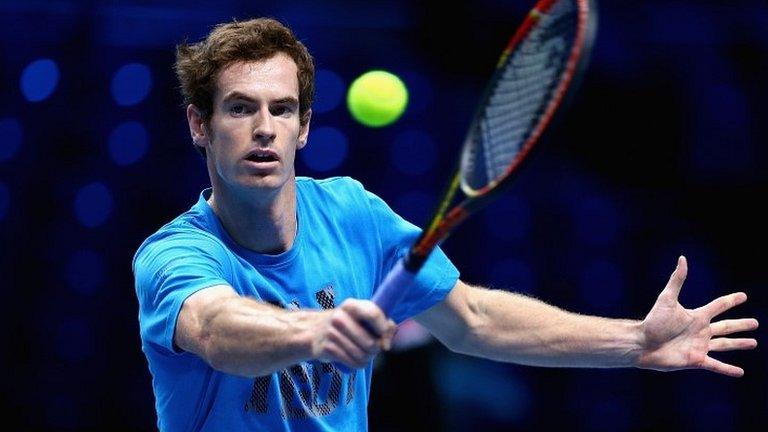
- Published17 June 2013
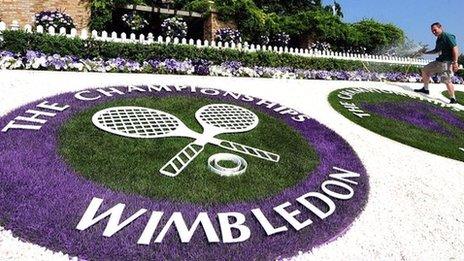
- Published30 May 2013
